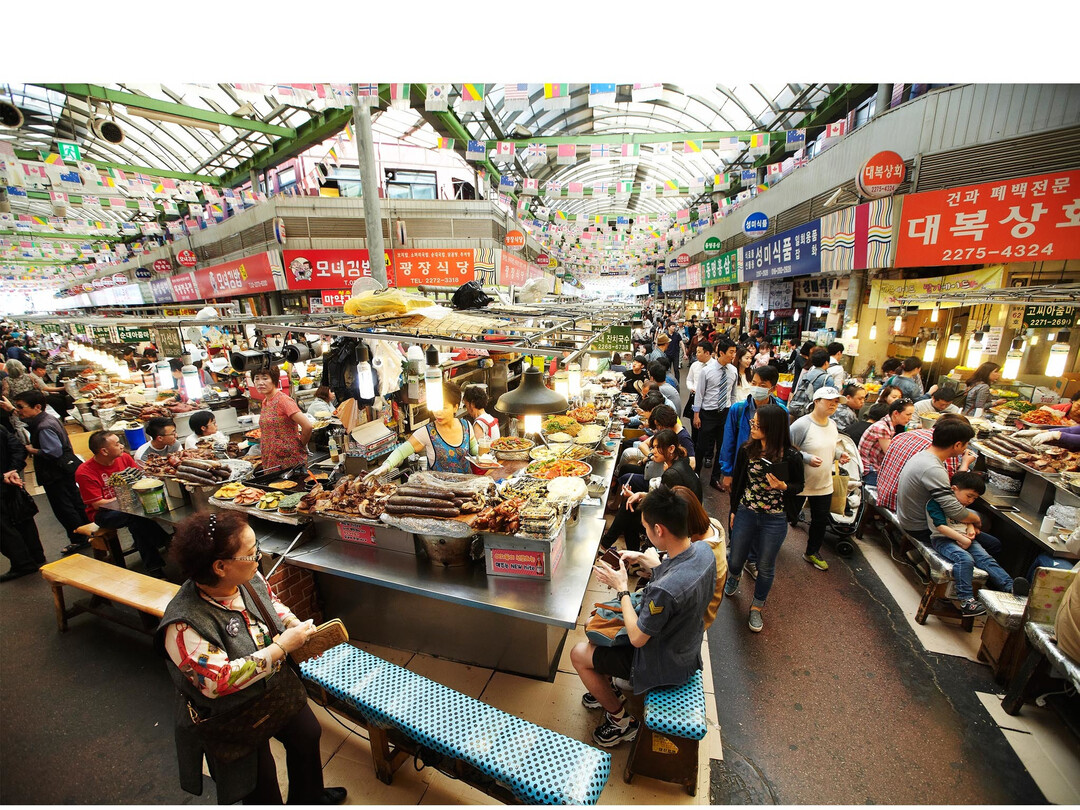
Gwangjang Market, nestled in the heart of Seoul's Jongno district, stands as a vibrant testament to South Korea's rich cultural heritage and burgeoning culinary scene. This bustling marketplace, a haven of sights, sounds, and tantalizing aromas, has become a must-visit destination for both local Seoulites and international travelers seeking an authentic Korean experience.
Established in 1905, Gwangjang Market boasts a history spanning over a century. Stepping into its lively alleys is akin to stepping back in time, offering a genuine immersion into Korea's traditional market culture, a stark yet charming contrast to the sleek modernity that defines much of Seoul.
At the heart of Gwangjang Market's allure lies its legendary food alley. From the moment visitors enter, they are greeted by a symphony of sizzling sounds and the savory scent of cooking oil emanating from the numerous street food stalls lining the pathways. These pojangmacha (covered food carts) are a culinary paradise, enticing passersby with an array of mouthwatering Korean delicacies.
The undisputed star of Gwangjang's gastronomic offerings is undoubtedly the nokdu bindaetteok, a savory mung bean pancake. Made from freshly ground mung beans, succulent pieces of meat, and crisp bean sprouts, these golden-brown pancakes boast a delightful crispy exterior and a flavorful, hearty interior. Equally popular are the steaming bowls of tteokbokki (spicy rice cakes in a rich broth), the savory sundae (Korean blood sausage), and the addictive mayak kimbap (mini seaweed rice rolls filled with pickled radish, carrots, and spinach, aptly named for their irresistible flavor).
Beyond the culinary delights, Gwangjang Market offers a treasure trove of sights and shopping opportunities. Wander through its labyrinthine corridors and discover a diverse range of goods, from exquisite hanbok (traditional Korean clothing) and intricate textiles to delicate handmade crafts and dazzling accessories. The market's reasonable prices make it a popular spot for souvenir hunting, allowing visitors to take a piece of Korean tradition home with them.
In recent years, Gwangjang Market has experienced a resurgence in popularity, particularly among younger generations and international tourists, thanks to its vibrant presence on social media. The market's unique blend of traditional charm and modern appeal has made it an "Instagrammable" hotspot. Quaint photo zones and strategically placed ambient lighting add to its visual appeal, providing perfect backdrops for capturing memorable moments.
Accessibility is another key factor contributing to Gwangjang Market's popularity. Situated conveniently near major subway lines, it is easily reachable for visitors exploring Seoul. A short five-minute walk from either Jongno 5-ga Station (Line 1, Exit 8) or Euljiro 4-ga Station (Line 2, Exit 4) brings you to the heart of this bustling hub.
For travelers seeking an authentic taste of Korean culture and a sensory feast in the midst of Seoul's urban landscape, a visit to Gwangjang Market is highly recommended. It's more than just a market; it's a living, breathing piece of Seoul's history and a vibrant celebration of its present.
Further Insights into Gwangjang Market:
Historical Significance: Gwangjang Market's origins trace back to the early 20th century, initially formed as a response to the Japanese occupation and the need for a centralized marketplace for Korean merchants. Its longevity reflects its enduring importance in Seoul's economic and social fabric.
Economic Impact: Traditional markets like Gwangjang play a crucial role in supporting local economies and preserving traditional crafts and trades. They offer a platform for small-scale vendors and artisans to showcase their products and contribute to the city's vibrant commercial landscape.
Cultural Preservation: Gwangjang Market serves as a vital link to Korea's past, offering a glimpse into traditional ways of life and commerce. The preservation of traditional foods, crafts, and the unique atmosphere of the market are essential for safeguarding Korea's cultural heritage.
Tourism Driver: The market's growing popularity among tourists highlights the increasing interest in authentic cultural experiences. Gwangjang Market's unique blend of food, shopping, and atmosphere makes it a compelling attraction, contributing significantly to Seoul's tourism sector.
Social Hub: Beyond its commercial function, Gwangjang Market serves as a social gathering place for locals. It's a place where people connect, share stories, and build community, reinforcing its importance as a vital part of Seoul's social infrastructure.
Challenges and Adaptations: Like many traditional markets, Gwangjang faces challenges such as competition from modern retail spaces and the need to adapt to changing consumer preferences. However, its recent success in attracting younger generations and international tourists through social media and its unique offerings demonstrates its resilience and ability to evolve.
Government Support: The Seoul Metropolitan Government has recognized the cultural and economic significance of traditional markets like Gwangjang and has implemented initiatives to support their preservation and modernization, ensuring their continued vitality in the urban landscape.
In conclusion, Gwangjang Market is more than just a place to buy and eat; it's a living museum, a culinary adventure, and a vibrant social hub that encapsulates the heart and soul of Seoul. Its rich history, diverse offerings, and accessible location make it an indispensable destination for anyone seeking an authentic and unforgettable Korean experience.
[Copyright (c) Global Economic Times. All Rights Reserved.]






























